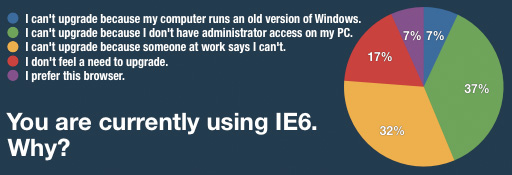IE6 Must Die, the title of Mashable’s latest post, hit the Twitter trending topics (it’s the new “Digg frontpage”) a few days ago. It’s really a good thing raise awareness for the browser we’ve been dying to get rid of for years now. But as much we should appreciate every little bit towards this goal, we should pay more attention as to why IE6 isn’t dead yet.
This Digg Blog post, Much Ado About IE6, sheds a good amount of light into that. Those who use IE6 to access Digg were also invited to answer a short, three-question survey that would hopefully reveal why they’re still using the outdated browser.
The results are thus: (a) More respondents used IE6 at work: a whopping 90% compared to 56% at home. (b) When asked why they don’t use another browser, majority say they can’t: either they don’t have sufficient computer access or workplace rights to do so, or the computer they’re using can’t handle modern browsers.

Granted, Digg is not a mainstream source of statistics. The amount of IE6 visitors are only at 10%, and more importantly, this social voting/bookmarking site has a strong geek slant. We can still learn from this unofficial study. As Mark Trammell concludes in the blog post:
Giving them a message saying, “Hey! Upgrade!” in this case is not only pointless; it’s sadistic.
How about we stop focusing on those who refuse to upgrade and try to help those who are simply unable to? All the campaign sites against IE6 don’t amount to much until they figure that out.
Just like the future of web typography means teaming up with the big-name font foundries to come up with a real solution to font embedding on web pages, eliminating IE6 would require reaching out to big businesses and convincing them to do large-scale upgrades in the workplace. On the Web, that’s already begun: we have the likes of Google and Facebook urging people to upgrade as they are dropping support for IE6.
But for non-technology companies, who’s going to reach out to them? Microsoft? W3C? WaSP? Assuming we found someone who will do the dirty deed, can they be convinced to drop a significant chunk of their market? Assuming the dirty doers manage that, can that significant chunk of their market be also convinced to stop accessing their sites using IE6, when in all probability they can’t? Should they be ignored?
The vicious cycle continues. (So much for freedom.)
Originally posted on July 21, 2009 @ 9:40 pm